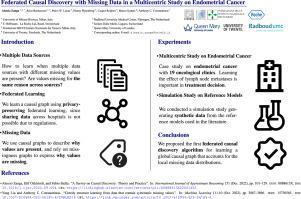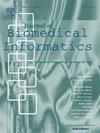子宫内膜癌多中心研究中缺失数据的联合因果发现。
IF 4.5
2区 医学
Q2 COMPUTER SCIENCE, INTERDISCIPLINARY APPLICATIONS
引用次数: 0
摘要
目标:建立因果关系在医学和保健等应用领域至关重要,在这些领域,决策必须是可解释的。在这些情况下,小样本量和缺失的数据需要联合方法来最大限度地利用我们可以使用的信息量。方法:我们提出了一种新的联邦因果发现算法,该算法能够汇集来自多个来源的异构缺失数据的信息,以学习表示因果关系的图。特别是,我们在集中服务器上学习因果图,同时考虑到每个客户端特定的先验知识和缺失机制。结果:我们将所提出的算法应用于一项子宫内膜癌多中心研究的合成数据和真实数据,通过定量分析和临床文献综述验证了所获得的因果图。结论:我们的方法学习了一个准确的模型,尽管数据缺少非随机。本文章由计算机程序翻译,如有差异,请以英文原文为准。

Federated causal discovery with missing data in a multicentric study on endometrial cancer
Objectives:
Establishing causal dependencies is crucial in applied domains, such as medicine and healthcare, where decision-making must be explainable. In these settings, small sample sizes and missing data call for federated approaches to maximise the amount of information we can use.
Methods:
We propose a novel federated causal discovery algorithm capable of pooling information from multiple sources with heterogeneous missing data to learn a graph representing cause–effect relationships. In particular, we learn a causal graph on a centralised server while taking into account both prior knowledge and missingness mechanism specific to each client.
Results:
We applied the proposed algorithm to synthetic data and real-world data from a multicentric study on endometrial cancer, validating the obtained causal graph through quantitative analyses and a clinical literature review.
Conclusion:
Our approach learns an accurate model despite data missing not-at-random.
求助全文
通过发布文献求助,成功后即可免费获取论文全文。
去求助
来源期刊

Journal of Biomedical Informatics
医学-计算机:跨学科应用
CiteScore
8.90
自引率
6.70%
发文量
243
审稿时长
32 days
期刊介绍:
The Journal of Biomedical Informatics reflects a commitment to high-quality original research papers, reviews, and commentaries in the area of biomedical informatics methodology. Although we publish articles motivated by applications in the biomedical sciences (for example, clinical medicine, health care, population health, and translational bioinformatics), the journal emphasizes reports of new methodologies and techniques that have general applicability and that form the basis for the evolving science of biomedical informatics. Articles on medical devices; evaluations of implemented systems (including clinical trials of information technologies); or papers that provide insight into a biological process, a specific disease, or treatment options would generally be more suitable for publication in other venues. Papers on applications of signal processing and image analysis are often more suitable for biomedical engineering journals or other informatics journals, although we do publish papers that emphasize the information management and knowledge representation/modeling issues that arise in the storage and use of biological signals and images. System descriptions are welcome if they illustrate and substantiate the underlying methodology that is the principal focus of the report and an effort is made to address the generalizability and/or range of application of that methodology. Note also that, given the international nature of JBI, papers that deal with specific languages other than English, or with country-specific health systems or approaches, are acceptable for JBI only if they offer generalizable lessons that are relevant to the broad JBI readership, regardless of their country, language, culture, or health system.
 求助内容:
求助内容: 应助结果提醒方式:
应助结果提醒方式:


